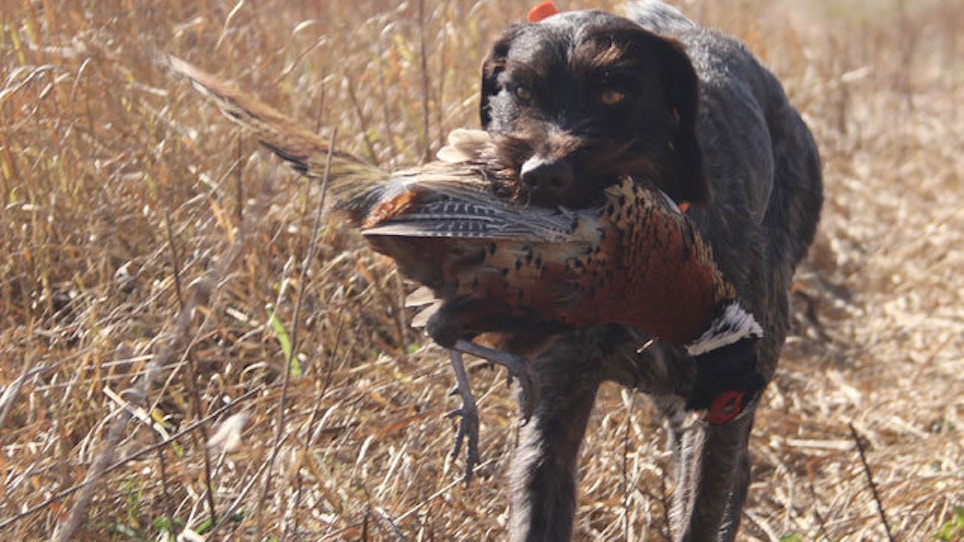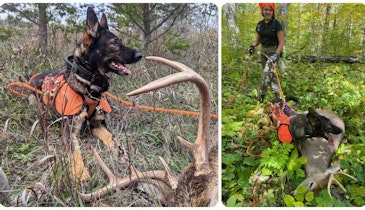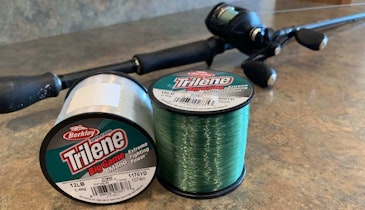Q: Scott, what are some methods to try with a dog that has a hard mouth or who is prone to chomping a bird on the retrieve? (not eating, just zealous death chomps).
A: Usually, I’ve been content to get a bird back, period. “Zealous death chomp” is not only a great name for a heavy metal band, but tolerated at times by this trainer. If it’s not truly “hard mouth” resulting in torn-up or swallowed birds, try shooting better so all the birds are good and dead before your dog retrieves. (That’s a little joke – I’m the last guy to be making suggestions like that.) But seriously, a live bird that flaps, flops, squawks or scratches is a bummer for your dog, no wonder he wants to quiet it down. Practice with dead birds for a while. The ultimate solution, though, is force training – the entire retrieve becomes an obedience skill with no tolerance for chomping.
Q: What is the best way to break a dog from jumping into the air to catch a bird on the flush?
A: If it’s a pointing breed, go back to steadiness training and “whoa.” If it’s a flushing breed, give him a dog biscuit for his spirit. Then, teach “hup,” with verbal and whistle commands – the dog should sit on the flush or command, or the shot, and not retrieve until commanded. No matter the breed or the weight of your game bag, don’t shoot low birds.
Q: I am an older hunter and am interested in getting a calmer-bred upland bird dog. Which one would you recommend?
A: Some of the versatile breeds may be just what the veterinarian ordered. “Ugly dogs” like the Spinone Italiano or Wirehaired Pointing Griffons generally hunt closer and slower than other breeds. The Clumber Spaniel is like a Springer in slow motion. Or, a field-bred cocker spaniel, once trained, will hunt close, and with such little legs, they can’t get up much speed!
Q: Scott, how and what have you found to help with the passing of one of your own dogs after they have celebrated their hunting career with you?
A: This one is tough and I’m sorry if you lost a dog recently. I’ll never get over the companionship, hard work and loyalty my dogs showed me. That’s the principal reason I make my TV show. To show my gratitude and respect, I wear my dogs’ collar tags on my whistle lanyard. I know someone who puts their dogs’ collars under the driver’s seat of their truck. Paintings, impressions of paw prints, you’ll find something that reminds you of the good times you had hunting with them.
Q: How can you overcome a young dog that seems lethargic when yard training? My six-month-old wirehaired Vizsla has all the energy in the world in the field but when training in the yard he tends to have a lot of quit in him.
A: Usually, yard work is booooooring to a dog. Remember your worst job? It’s like that, which is why they gave you money to do it. Offer praise, treats or whatever reward serves as your dog’s “paycheck.” Yard training is especially dull if it moves slowly, with little challenge or progression in skill level. Or worse, when birds aren’t part of the equation. Bring birds and I bet he’ll perk up. Be methodical in how you progress from basic skill to more advanced work, but keep it moving forward, even if you experience setbacks periodically. Raise the bar, challenge your dog regularly, and make it fun.
Q: I have a one-year-old Lab. She is very smart and well behaved until we have guests. She will jump up, bark, and whine when she normally doesn't. What are some ways of correcting this behavior?
A: At least you didn’t mention crotch sniffing! Short answer: gradual conditioning, baby steps. Identify and eliminate triggers (doorbell, for example). Teach obedience: sit, stay, quiet. Keep the energy level low. Put some distance between the dog and the guest, working closer and closer as the dog remains calm and on task with the command. Be ready to correct, i.e. praise when she obeys, and move guest and dog closer together over many practice sessions. I’ve found that yelling doesn’t help – it actually can raise the excitement level and things spiral out of control faster.
Want more stories and videos? Check out the Scott Linden Outdoors Channel.






